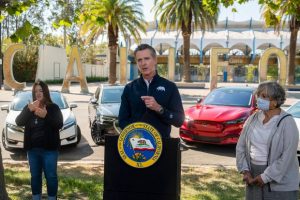Newsom Signs Executive Order to Ban Sales of Gas-Powered Vehicles in California
Alyssa Mar
Trending Writer

By 2035, California will ban the sales of gas-powered cars statewide. This executive order was signed by Californian Governor Gavin Newsom on Wednesday, September 23rd as an effort to curb the ongoing climate crisis.
With the goal of a complete adoption of zero-emission vehicles by 2045, this order is believed to significantly reduce greenhouse gas emissions by 80% through eliminating tailpipe pollution. Greenhouse gases are the cause of rising sea levels, increasing temperatures, and severe weather events. Most notably, California suffers from constant ravaging wildfires that continuously deplete the state of acres and healthy air. Further, these wildfires are the main cause of injury and death to citizens located in the vicinity. According to meteorologist experts, “with the way greenhouse gases are increasing, in my mind, there’s no doubt that we’re causing this. It’s human activity that’s causing this.” This order, however, does not ban the use of gasoline-powered vehicles, nor the selling of them in the secondary market after 2035.
There have been many supporters and critics of this movement and debates over how it will affect the U.S. economy in the future are erupting. Experts have noted that this move will cut greenhouse gas emissions in California by 35%. As California stands as one of the most populated states in the country, this percentage change is predicted to have a greater impact on the United States as a whole.
A shift to electricity-powered vehicles, instead of fuel, could also signify a decrease in supply of the crude oil commodity. Despite the signing of the executive order, California is still permitting fracking permits, as they heavily depend on fossil fuels for power. Not only that, but also Newsom and the Trump administration are altercating in this dilemma. Last year, the Trump administration revoked California’s permission for regulating greenhouse gases from cars. According to State Senator Melissa Melendez (R – Lake Elsinore), “the move would spur a backlash among California residents already struggling with the state’s high cost of living and unemployment due to coronavirus closures.” She also stated that many could perceive his order as “taking away their choice.”
Californian Republicans also question the affordability of the project as there has been some concerns revolving around electric vehicle affordability. Studies have shown that Californian energy policies tend to benefit the wealthy more than the poor. Correspondingly, low-income citizens potentially would have to live with California’s disproportionate higher energy costs as they are less likely to afford sustainability supplies, such as solar panels and electric vehicles.
In response to the criticism, Newsom stated, “We’re not taking anything away. We’re providing an abundance of new choices and new technology.” Newson continues that the act is not solely limited to EVs (electric vehicles), but its scope includes generally anything that can be zero-emission. Furthermore, he stresses that the lower cost of maintenance associated with electric vehicles could aid in offsetting a higher price purchase. He also adds that studies are already underway to accommodate workers who might have been affected by the “phase-out” approach to zero-emission and include them in a transition of new opportunities, increasing employment levels.
Though Democratic presidential candidate, Joe Biden did not officially endorse Newsom’s signing of the order, the views are relatively consistent with Biden’s vision of boosting their manufacture in America. The continuation of the order to a potential mandate would highly be dependent on either leveraging a Trump or Biden win in the presidential election in the next coming weeks.
In wake of the movement of moving into a less polluted economy, China, Japan, and Israel are participating countries that have set benchmarks in accordance to adopting electric vehicles. Newsom leaves us off with the question, “15 countries have already established mandates for clean emission vehicles; how can American manufacturers compete if they are not in this segment?”
Contact Alyssa at maralyss@shu.edu

